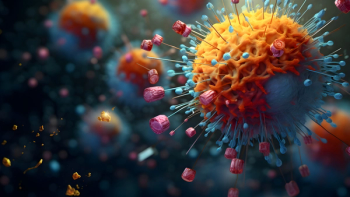
- Pharmaceutical Executive-11-01-2020
- Volume 40
- Issue 11
Advancing the Science for Minds: Dr. Husseini Manji, J&J
Dr. Husseini Manji talks to Pharm Exec about his new role as J&J's Head of Science for Minds and how he hopes to foster new ways to treat dementia and serious mental disorders and provide holistic mental care.
In July, Husseini Manji, M.D., F.R.C.P.C. was named by Johnson & Johnson (J&J) as the head of its new Science for Minds endeavor. The appointment follows Manji’s eight-year tenure as Global Therapeutic Head for Neuroscience at Janssen Research & Development (a J&J company) and draws on his prior experience as Chief of the Laboratory of Molecular Pathophysiology & Experimental Therapeutics at the National Institutes of Health (NIH).
As well as founding and co-directing NIH’s graduate course in the neurobiology of neuropsychiatric illness, Manji developed and served as the director of the NIH’s Mood and Anxiety Disorders Program (MAP) 2004–2008. MAP was the world’s largest research program of its kind; it brought together almost 450 scientists with diverse expertise—human genetics, epidemiology, molecular biology, experimental therapeutics, biomarkers, etc—to investigate the diagnosis, treatment, and prevention of serious mood and anxiety disorders, with the development of novel therapeutics as its top priority. Taking the MAP experience as a template on which to develop and guide his mission as J&J’s Head of Science for Minds, Dr. Manji sat down with Pharm Exec recently to discuss his new role and how he hopes to foster new ways to treat dementia and serious mental disorders and provide holistic mental care.
PharmExec: What attracted you to working for the industry after a long and successful career at the National Institutes of Health (NIH)?
Dr. Husseini Manji: I thought I’d be at NIH forever until J&J contacted me and convinced me that, with the scientific advances taking place, I could actually help millions of people by helping to develop new treatments. Research is important, of course, but actually coming up with new treatments is something else. I had been one of those people in academia who thought they were achieving good target validation, for example, until they come into the industry and realize the level of rigor. I realized that a lot of my findings were probably going to just sit there unless there was some sort of concerted effort to take it forward where industry could pick them up and develop new treatments. So I was delighted to join J&J. As the Global Therapeutic Head of Neuroscience for Janssen Research & Development, I created, led, and provided oversight for the Neuroscience Therapeutic Area (TA) end-to-end strategy from discovery of small and large molecules through commercialization. I was delighted during that time to have launched the first novel antidepressant mechanism in about six decades, SPRAVATO.
PE: Can you outline the Science for Minds project and your role within it?
Manji: Science for Minds was created to bring together what we might consider an inclusive and open research culture, focusing on the pillars of science, innovation, and society to really tackle some of these psychiatric and mental health issues in a very meaningful way. Some of these projects are going to be completely open, with data sharing and non-proprietary research. Some might have shared IP, so that industry partners can pick up a treatment and license it. The three big areas we're going to focus on are dementia, serious mental disorders, especially in the youth, and holistic mental care.
In the dementia treatment space, one of the problems we've had is establishing early clinical proof-of-concept compared with, say, oncology, where you can often get the information you need in Phase I. There have been a lot of advances in terms of genome-wide association studies, but true target validation is still a bit lacking, as are experimental medicine tools and technologies. So, one of the things that we‘re going to do is to form a consortium, comprising experts from different companies, different governments, different universities, that will work together, and I mean physically work together. There have been advances in dementia in terms of novel targets and many of the genome-wide association studies. But they’re not at the point where you can really execute interventions. So this is going to require a Manhattan Project-like approach.
On the other hand, people with mental health issues, mood disorders, are not on a downward course like those with neurodegenerative disorders. These conditions are highly cyclical and recurrent; they can be helped with things like digital technology and understanding how to mediate symptoms. There have been lots of advances, certainly in biology but also in digital technology, but we haven't quite figured out how marry both biology and digital technology to improve outcomes. Tackling this issue is something Science for Minds will be focused on. We're also launching—with the National Academy of Medicine, the Wellcome Trust, and Garen Staglin of One Mind—the Healthy Brains global initiative, for which we’re trying to bring together $10 billion of new research funds to drive things forward. Hopefully, this will result in some very novel science, but also some novel funding mechanisms.
PE: How has COVID-19 further impacted your efforts on issues such as depression and anxiety?
Manji: COVID-19 has brought mental health issues into even sharper focus, and is affecting people with and without pre-existing mental health conditions. It is also affecting those who provide care. One of the initiatives we have in the U.S. is called First Responders First, which recognizes that first responders, public healthcare workers, are under tremendous stress. They have had to endure a lack of personal protective equipment; they had to work incredibly long hours, often in intensive care units. They have had to watch people die. And they couldn't even be with their relatives because of fear of infection; many of didn't even go home to live because they were concerned about taking the infection to their families. So we've got a major mental health and resilience effort underway to help them, in collaboration with Harvard School of Public Health and others. It is not about state-of-the-art medication; it's teaching people about ways to cope and encouraging positive changes in mental health and well-being, delivering content and practices that are evidence-based and grounded in action for those braving the pandemic head-on.
PE: The stigma around depression and anxiety is being lifted to some extent, with people talking about these issues much more openly. Is that something we need to happen for conditions such as schizophrenia and Alzheimer's Disease?
Manji: I think that, much like HIV or even cancer, once you have the science that shows that someone was seriously ill, and then they become well again after treatment, that starts to reduce the stigma. My main goal is to come up with better treatments and care for people with conditions such as schizophrenia. But even the treatments we have that work don’t get to many patients, or at least don’t get to them until they are at the equivalent of stage-four cancer, because of the surrounding stigma and lack of awareness. That's a big problem we're trying to address. We have an initiative called Science Over Stigma to really get the word out about some of the scientific underpinnings of these conditions. Just as you cannot will your pancreas to secrete more insulin if you are diabetic, you cannot control your symptoms of severe depression or schizophrenia.
PE: Looking at it from a company perspective, are there concrete milestones that Science for Minds needs to hit?
Manji: Like any business, you can't just dabble, so to speak. You have to have some serious milestones. I would say our mission is more concrete, making a focused effort to make sure that the research really is related to identifying and validating targets. J&J may or may not pick up the targets. The idea, though, is that if we can really advance the science—and the unmet need is staggering—we can really develop tools that make clinical trials easier or more executable, and that is clearly something that is core to J&J.
Julian Upton is Pharm Exec’s European and Online Editor. He can be reached at
Articles in this issue
over 5 years ago
Synthetic Biology and the Environmentover 5 years ago
Measuring Pharma’s Wider Mandateover 5 years ago
Patients as the North Starover 5 years ago
A Rare-Disease Must? Building Long-Term Relationshipsover 5 years ago
Making Remote Work a Success Beyond COVIDover 5 years ago
CRISPR for Diversity, and Humanity’s, Sakeover 5 years ago
Expediting the Cancer Treatment Pathover 5 years ago
Vaccine Authorization, Distribution Raise Multiple Challengesover 5 years ago
Pharmaceutical Executive, November 2020 Issue (PDF)Newsletter
Lead with insight with the Pharmaceutical Executive newsletter, featuring strategic analysis, leadership trends, and market intelligence for biopharma decision-makers.




